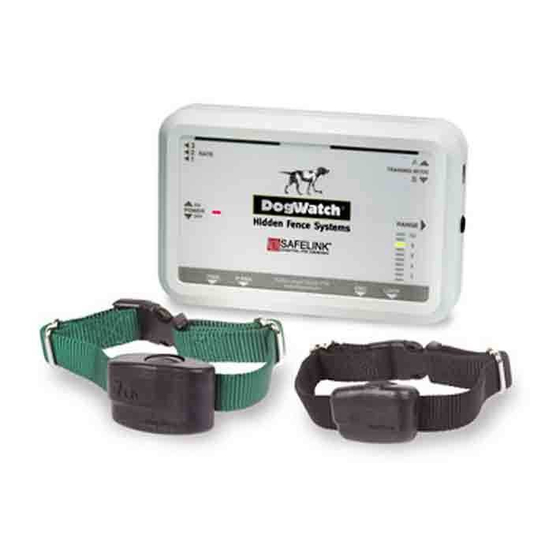DogWatch Hidden Fence System Gebruikershandleiding - Pagina 10
Blader online of download pdf Gebruikershandleiding voor {categorie_naam} DogWatch Hidden Fence System. DogWatch Hidden Fence System 15 pagina's.
Ook voor DogWatch Hidden Fence System: Gebruikershandleiding (14 pagina's)

UNDERSTANDING ESCAPE/AVOIDANCE CONDITIONING
TEACHING
This section covers the steps necessaiy to teach your dog to remain within the designat
ed boundaty of your property. Actually this section teaches you how to teach your dog, so
it is extremely important that you understand each step completely
Adjust Collar
1'.;'
You are now going to learn how escape/avoidance conditioning works. These are the
principles involved in teaching your dog to respond to the DogWatch Hidden Fence
System. Escape training simply rneans that a particular response terminates an unpleas
ant feeling. An example of this is when a dog runs into his doghouse to escape the rain of
a thunderstorm.
ESCAPE TIutw4lNc
CUE
AVERSIVE
RESPONSE
Thunder
Rain
Runs into house
Avoidance training is merely an extension of escape training. What happens to the dog
that ran into his doghouse? After several storms he learns to avoid, rather than escape
the rain. As soon as he hears the thunder, he runs into his doghouse and never gets wet.
(
I
Y~l
'I
~
'~a
ff
1'
tact Posts
Touching Skin
Battery Cap
Facing Downward
How this looks in behavioral temis:
AVOIDANCE TRAINING
ATrITUDE
Teaching your dog something new should be fun for both of you. Therefore, it is very
important that you retain an upbeat, positive attitude throughout the entire teaching pro
gram. If you remain upbeat, so will your dog. If you become nervous or frustrated during
the teaching process, your dog will pick up on your negative attitude, and that will be
reflected in how he learns. Your dog must understand that you are the leader and he is
the follower. Remember to be fair and consistent to maintain his spirit.
Once you begin the program, allow a minimum of seven days to elapse before allowing
your dog in your yard without a lead. Keep teaching sessions short
—
approximately ten
minutes
—
and fun. Your dog should be at least six months old. He should be trained to sit
and walk properly on a lead prior to being introduced to the DogWatch Hidden Fence
System. If you have more than one dog, each should be trained separately.
Think of your property having two distinct zones:
1) safety zone:
2) avoidance zone:
When your dog crosses into the signal field, the receiver collar emits an audible warning
followed by electrical stimulation. The audible warning is the CUE, and the electrical stim
ulation is the AVERSIVE. The objective of the training is to teach your dog to respond to
the cue by retreating to the Safety Zone.
When your dog is thoroughly trained, he will remain inside his Safety Zone.
Training
In behavioral terms This situation looks like this:
How the Dog Watch Hidden Fence System works:
the area where your dog is free to play.
the signal field created by the boundary wire.
